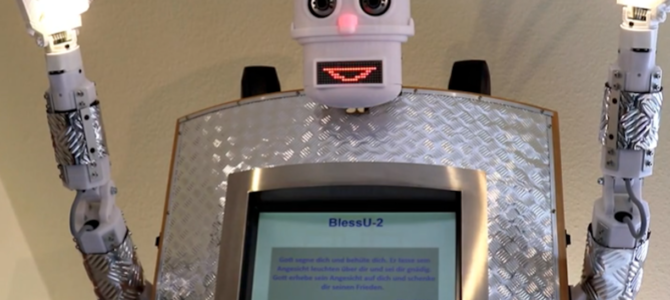
As part of an exhibition to mark the 500th anniversary of the Reformation, a church in Wittenberg, Germany, has unveiled what it calls a “robot priest,” a machine that emits lights from its outstretched hands and dispenses blessings in five languages. The robot, called BlessU-2, will spout out whatever blessing a parishioner selects from a touchpad screen on its chest. The boxy, metallic thing looks like something from a 1950s sci-fi film, and moves like one, too. A video of BlessU-2 in action shows it slowly raise its arms over its head, gears whirring, before it blurts out a pre-recorded blessing in German.
Aside from the creepy aesthetic of the robot, the very idea of programming a computer to bless people is itself a searing indictment of the collapse of Christianity in Europe. Stephan Krebs of the Protestant church in Hesse and Nassau, which came up with the robot idea, told The Guardian, “We wanted people to consider if it is possible to be blessed by a machine, or if a human being is needed.”
Given the rapid disappearance of Christianity in Europe, that seems like an odd way to mark the quincentennial of the Reformation. More than odd: it seems like a deliberate attempt to talk about something other than what Christianity is and why Europeans, like all people, desperately need to hear the gospel of Jesus Christ for their eternal salvation.
Alas, those are alien concepts to an increasingly secular Europe because church leaders don’t want to talk about them. People like Krebs would rather try to dazzle and provoke “debate” about an asinine proposition—that a robot can bless someone—rather than draw unbelievers into the mysteries of faith.
Secularization Is Killing The Church
Meanwhile, Christianity is disappearing from the European continent. Two years ago, Damian Thompson noted in The Spectator that in the first decade of the twenty-first century, the number of Christians in Britain fell by 5.3 million, or about 10,000 a week. At that rate of decline, he wrote, “the mission of St Augustine to the English, together with that of the Irish saints to the Scots, will come to an end in 2067.”
That is the year in which the Christians who have inherited the faith of their British ancestors will become statistically invisible. Parish churches everywhere will have been adapted for secular use, demolished or abandoned.
Our cathedral buildings will survive, but they won’t be true cathedrals because they will have no bishops. The Church of England is declining faster than other denominations; if it carries on shrinking at the rate suggested by the latest British Social Attitudes survey, Anglicanism will disappear from Britain in 2033. One day the last native-born Christian will die and that will be that.
The decline might be accelerating even beyond these dire projections. In January, the number of people attending weekly Church of England services dropped below one million for the first time ever, accounting for less than 2 percent of the population. Church attendance is now at half the level it was in the 1960s.
Thompson argues the reason for all this is secularization—and not just secularization of the wider culture but secularization occurring within the church, with liberal pastors and clergy taking up whatever latest progressive cause comes across the transom. This is a familiar story in America, too, where mainline Protestant churches, whose chief concerns these days seem to be climate change and gay marriage, are going the way of the Church of England. If current trends continue, America’s mainline churches have only 23 Easters left before they’re empty.
It’s not just mainline Protestant churches. In a recent interview with Spanish paper El Mundo, Arturo Sosa, the Jesuit superior general, said humans have created the idea of the devil to help suppress evil in the world. “We have formed symbolic figures such as the devil to express evil,” he said. “Social conditioning can also represent this figure, since there are people who act [in an evil way] because they are in an environment where it is difficult to act to the contrary.”
The Catechism of the Catholic Church says otherwise—that the devil is a created being, a fallen angel who rebelled against God. It also says people act in an evil way because of their fallen human nature, not their environment. But such is the state of the church—even the Catholic Church.
Some Church Leaders Are Choosing Oblivion
A spate of books by Christian writers published last year grapple with the implications of a totally secular society hostile to Christianity. Some of them, like Anthony Esolen’s “Out of the Ashes” and Rod Dreher’s “Benedict Option,” argue that Christians should batten down the hatches and prepare for things to get very difficult for believers in Europe and North America.
Although these books are framed as ways for Christians to respond positively to the societal decay around them, the overarching message is dire: Christians need to stop telling themselves that electing Republicans to office or staging pro-life marches is going to save them from becoming outsiders or suffering persecution. The truth is, Christians are already outsiders, and if they are going to preserve the western church for future generations they need to begin building communities for that purpose and separating themselves from the mainstream of society.
That’s sage advice, and it involves some hard choices. Among them is recognizing the extent to which church leaders and institutions have abandoned the faith in favor of secularism. “When your only choices are repentance or oblivion, you repent,” writes Esolen.
But that’s not entirely true. Sometimes people choose oblivion—and sometimes oblivion takes the form of a robot repeating a programmed blessing for anyone who might want one. But who would?









